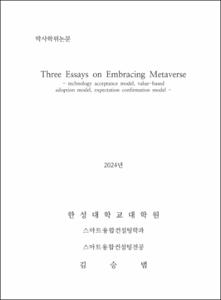Three Essays on Embracing Metaverse
= 메타버스 수용에 관한 세 가지 소논문
- Type
- Thesis
- Alternative Title
- technology acceptance model, value-based adoption model, expectation confirmation model
- Advisor
- 이형용
- Department
- 대학원 스마트융합컨설팅학과
- Issued Date
- 2024
- Publisher
- 한성대학교 대학원
- Appears in Collections:
- 스마트융합컨설팅학과 > 1. Thesis
- Files in This Item:
-
-
Download
 200000725293.pdf
기타 데이터 / 1.24 MB / Adobe PDF
200000725293.pdf
기타 데이터 / 1.24 MB / Adobe PDF
-
Items in Repository are protected by copyright, with all rights reserved, unless otherwise indicated.